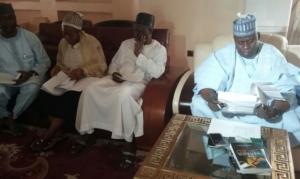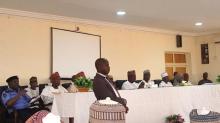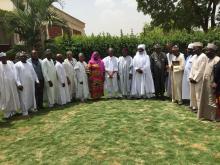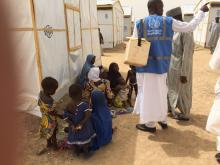Stakeholders in the North East leverage on improved accessibility to provide integrated health services.
Maiduguri, 23 March 2016 - The Governors of the three (3) security compromised states of Adamawa, Borno and Yobe in the north east zone have reaffirmed their commitment to building resilience towards certification of polio eradication in 2017 and beyond, through conscious efforts of strengthening routine immunization (RI) and investing more resources towards the delivery of primary healthcare. Their renewed resolve was informed by improved accessibility to hitherto security compromised areas and contained in messages delivered by the respective Deputy Governors during the recent inauguration of the state and local government (LGA) Task Forces on Immunization (TFI) of their states.
The TFIs have been understandably dormant for over five (5) years in Yobe, Adamawa and Borno due to hightened activities of insurgents which prompted inaccessibility to sizeable parts of the states. With increasing access to most of the communities, the policy makers have already swung into action by holding inaugural meetings during which they developed workplans and endorsed itineraries for supportive supervision.
Inaugurating the TFI in Yobe, the Deputy Governor, His Excellency Abubakar Aliyu, publicly acknowledged the commitment of World Health Organization (WHO) to the state over the years in the fight against polio and in strengthening RI despite the security challenges faced by the state over the last five (5) years. “I wish to categorically salute the undiminished support of the WHO and the courage of its staff for staying with the state throughout these difficult times to rid it of polio and other vaccine preventable diseases even at the expense of their personal safety” he said.
His counterpart in neighboring Adamawa State, His Excellency Martins Nasiru Babbale while reading the terms of reference (TOR) of the TFI to other members, reiterated that strengthening PHC services remains the cornerstone for healthcare delivery and for improving the wellbeing of the citizens. A similar event was conducted in Borno state; designed to re-invigorate RI and PHC activities at the grassroots.
The Deputy Governors, who also double as the Chairmen of the state TFIs, further maintained that the inauguration of the state and LGA TFIs will strengthen RI which remains the most effective approach for protecting children from the six (6) childhood vaccine preventable diseases. They also restated the fact that RI performance in the zone remains among the poorest in the country.
Fertile grounds for “tOPV Switch”
With the renewed political commitment and as Nigeria prepares for the 18 April, 2016 “Switch” from trivalent oral polio vaccine (OPV) to bivalent OPV (bOPV), the government with full support from WHO, is leaving no stone unturned in the security compromised states for the total withdrawal of remaining vials of tOPV from immunization service delivery points to avoid its usage by accident.
The switch to bOPV is a globally synchronized activity in 155 countries during the period 17 April to 01 May 2016 and is in line with the Global Polio End Game Strategic Plan.
During a recent visit to the North East zone, Dr Fiona Braka WHO EPI Team Leader (TL) held fruitful discussions with His Excellency the Deputy Governor of Bauchi, Commissioners for Health of Bauchi, Borno and Yobe states, Polio Emergency Operation Center (EOC) teams, as well as with paramount traditional leaders. She used the opportunity to discuss and commend the preparations to date for the switch in the three states. Furthermore, she applauded the various state governments for their leadership roles in ensuring the absence of Wild Polio Virus (WPV) and circulating Vaccine Derived Polio Virus (cVDPV) for over 33 months and 16 months respectively in the entire zone and the remarkable improvement in surveillance sensitivity.
She however urged the states “to remain vigilant towards achievement of regional and global certification as well as must build on the legacy of polio eradication to achieve broader public health goals”.
Lifeline for the hard-to-reach project
The hard-to -reach project is being implemented with technical support of WHO and funding by the Bill & Melinda Gates Foundation in Bauchi, Borno, Yobe and Kano that are very high risk for polio transmission. Two (2) additional states (Katsina and Kaduna) are also benefiting from the same source of funding with support through UNICEF. The project engaged 65 mobile health teams to provide vaccination sessions; maternal, new born and child health (MNCH) services; and treatment of minor illnesses in pre-selected settlements since July 2014 and is expected to end by June 2016.
The EPI TL used the occasion of her visits to Bauchi, Yobe and Borno to advocate for urgent buy-in by the states implementing the hard-to-reach project for its sustenance after June 2016.
The respective state authorities who appreciated the great support of the project in delivering key MNCH interventions to women and children in the most remote and high risk areas, expressed the critical need to continue the services and pledged to mobilize the necessary support to ensure sustained services.
Inspection of Polio laboratory facilities
Inspecting facilities at the WHO-designated polio laboratory at the University of Maiduguri Teaching Hospital, Dr Braka congratulated the team for maintaining accreditation standard performance and emphasized the important role of the laboratory in achieving certification standard surveillance within the goal of polio eradication. All type 2 polio viruses in the laboratory were destroyed in early February 2016, which was a key requirement of phase 1 containment, in preparation for the switch and within the Polio End Game Strategy. Work is underway to relocate the laboratory to a renovated facility within the University campus.
Furthermore, while in Borno, the epicenter of the insurgency in Nigeria, Dr Braka undertook other activities which included field visits to internally displaced peoples camps, supervision of health camp activities, monitoring of hard-to-reach teams as well as meeting with partners at the EOC.
_______________________________
Technical contacts:
Dr Fiona Braka; Tel: +234 703 170 5252; Email: brakaf [at] who.int (brakaf[at]who[dot]int)
Dr Abdelrahim Khalid; Tel: +234 803 402 1284; Email: abdelrahimk [at] who.int (abdelrahimk[at]who[dot]int)
Dr Umar Mustapha; Tel: +234 803 616 9972; Email: umarm [at] who.int (umarm[at]who[dot]int)
Media contact:
Ms Charity Warigon; Tel: +234 810 221 0093; Email: warigonc [at] who.int (warigonc[at]who[dot]int)
_______________________________
Below:
01 Adamawa State Deputy Governor reading the TOR at the inaugural meeting of the TFI
02 Inauguration of TFIs in Yobe State
03 Dr Braka, Bauchi Deputy Governor (middle), Emir of Dass (in turban) and other political and traditional leader
04 WHO team providing services in Bakasi IDP camp in Maiduguri







